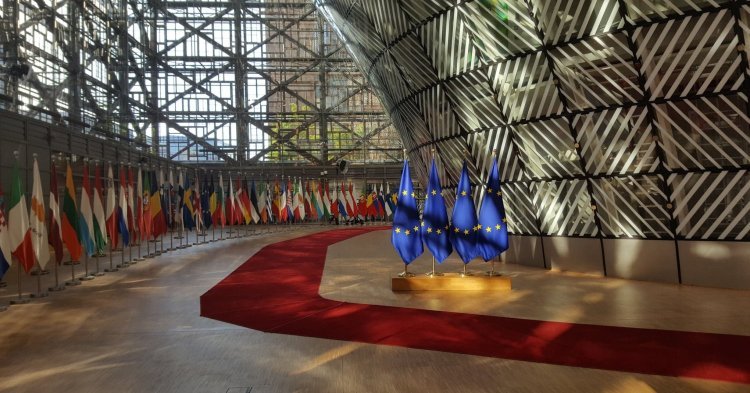Death to the Spitzenkandidat process?
The Spitzenkandidat process has never been about the party who won most votes - no matter how much Weber insisted on that. The process will always require an agreement among more than one party in the European Parliament, due to the fact that no one party cannot hold a majority.
Thus, the top jobs of the EU will be taken by politicians from different parties among other things, which might bring a balance to the EU and not tip the scale towards one single point on the political spectrum. Of course, there are always downsides to this, for example, how much slower the process is. However, given the present circumstances, the Spitzenkandidat process was one step towards a more democratic Union.
White smoke from the Council building
One might have hoped the days when the top jobs of the EU were decided behind closed doors, by less than 30 people, were long gone. Yet, the citizens of Europe find themselves again waiting for the white smoke to appear from the European Council building and to see who the next leaders of Europe are supposed to be.
As the new package has been announced, there has been a general outcry due to the nominations. The Spitzenkandidaten were put aside for a minister from a national government. No matter how competent she might be, Ursula von der Leyen was not a Spitzenkandidat, a candidate for the Parliament nor a figure in the EU bodies.
She appeared seemingly out of nowhere, at the summon of the current members of the European Council in a veritable showcase of questionable decision-making. The public outcry has been significant, and many people on social media were asking: “Where are the Spitzenkandidaten we voted for?”
Here is the trick though. You didn’t vote for them.
A simple solution
It is no secret that the EU is suffering from a democratic deficit and it is in dire need of reform. I do not intend to talk about abolishing the European Council due to the wrenches it more often than not puts in the functioning of the EU.
Instead, we could focus on a simple solution, which is a step further in the Spitzenkandidaten process: directly electing the President of the Commission. Adding the option of electing this position separately from the parties on the electoral lists would enhance the process and give the citizens further power in the decision-making structures of the Union.
It has been shown in the past weeks that the top jobs of the EU cannot be picked by leaders of the nation states as they cannot be bothered to put their personal interest and power games aside for the sake of a well-functioning Union. At this point, one cannot even argue they are prioritising the national interest. A badly functioning EU is not beneficial to the nation states either, it only helps to further personal power plays and interest within nation states.
The citizens are, for sure, not being helped by those decisions and their choices are not being respected. A direct election of the Commission’s president is one significant step towards helping the citizens of the Union make their voice heard.
The European Union is supposedly the most democratic region of the world and it should act as such. Shady dealings behind closed doors with a limited number of people in charge of the decision-making process is not democracy.
Vetoing a very competent candidate for standing up for European values because it undermines your little corrupted games and powerplay that crippled the rule of law and human rights back home is not democracy.
Proposing a president of the Commission straight out of a national government, who has little to nothing to do with EU affairs, when the Spitzenkandidat process exists, is not democracy.
And it seems a good chunk of Europe’s leaders forgot this.
One can only hope the European Parliament - the only directly elected body of the European Union - will not accept such a blatant breach of transparency and lack of consideration towards the European democratic process and the European citizens.



1. On 3 July 2019 at 21:13, by Ian Beckett Replying to: Slaughter of the Spitzenkandidaten system showcases need for democratic EU reform
Replying to: Slaughter of the Spitzenkandidaten system showcases need for democratic EU reform
You are right to say “It is no secret that the EU is suffering from a democratic deficit and it is dire need of reform.” We could argue regarding the nature of these reforms but let’s just consider the ‘democratic deficit’, I will not harp on here about second referendums, ignoring votes, the Lisbon Treaty or the Edinburgh Agreement etc. But specifically the EU is an organisation where the Council does not allow public access, the recording of minutes or voting. In short no one can ever know what was discussed or positions taken. The same applies in the triologue process in which the Parliament is fully engaged. The Eurogroup (a body that has no legal basis at all in EU law) likewise keeps no minutes and doesn’t even share its decisions publicly. THE ECB does take minutes on such things as interest rate discussions and decisions, but does not release them for 30 years. By contrast the Bank of England releases its minutes on interest rate decisions after 14 days. The head of the civil service (Martin Selmayer) is promoted from Chief of Staff for the Commission President to a Deputy Secretary General of the EU Commission then Secretary General on the same day, the Commission just ignores all complaints. Parliamentary seats are allotted by reverse proportionality. Each French MEP represents approx. 880K people, whilst each Maltese represents approx. 70K, ie a Maltese vote is worth about 12.5 times that of a French one. The appointment of committee chairs within the Parliament are supposed to be allocated by the D’Hondt system, but all anti EU parties are ruled out thereby structurally disenfranchising the tens of millions who voted for them. I could go on. But what you have essentially is a body specifically designed to avoid any form of accountability or transparency. By the way in 2014 the EP secretariat-general refused any cooperation with Transparency International as part of their study into the EU, the only EU institution to do so, and this is the body you expect to protect EU democracy?
Follow the comments: |
|
